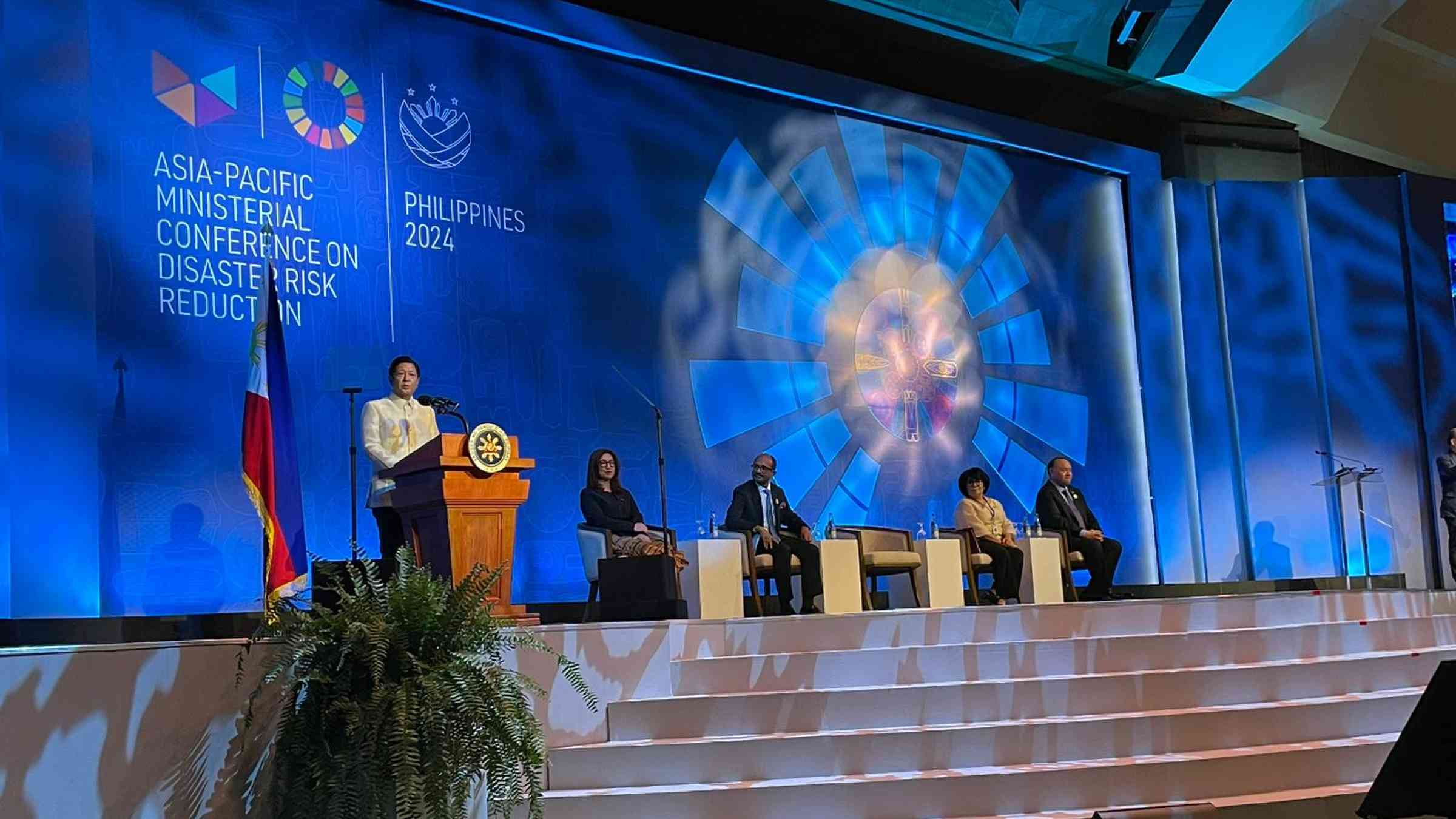Opening of the Asia-Pacific Ministerial Conference on Disaster Risk Reduction 2024 in Manila: A Call to Action on Resilience, Cooperation and Finance

Opening Ceremony APMCDRR 2024, 15 October 2024
Philippines, 15 October 2025 - The Asia-Pacific Ministerial Conference on Disaster Risk Reduction (DRR) 2024 officially opened today in Manila, bringing together over 7000 ministers and delegates from across the region to address the critical need for enhanced action on disaster risk reduction. The conference, running across the week from 14-18 October, is focused on greater action on resilience in the face of increasing disaster and climate risk.
At the opening ceremony, President Ferdinand Marcos, Jr of the Philippines emphasised the need for stepping up action, "We share a common struggle, navigating the balance between continued economic growth and dealing with the ever-present threat of disasters. Our path now is to redouble efforts to accelerate action".
"We must significantly increase our investments and develop financing mechanisms in disaster risk reduction" said President Ferdinand Marcos, Jr as he emphasised funding as a priority issue of the conference and called for greater access for developing and least developing countries to financial resources.
Kamal Kishore, Special Representative of the UN Secretary-General for Disaster Risk Reduction underlined "the Asia-Pacific region is one of the most disaster-prone areas in the world but also a pioneer on disaster risk reduction which has been replicated around the world".
He highlighted the Philippines as leading on inclusive approaches with more than 40 government departments along with civil society and the private sector engaged on the APMCDRR and wider DRR programmes.
"The future looks uncertain - increasing and more complex disasters and we are lagging behind in meeting the goals of the Sendai Framework. As we confront the realities, we must deepen collaboration, ensure dedicated funding in national budgets and local and inclusive approaches to disaster risk reduction."
Across the week, participants will engage in discussions on key themes, including financing, inclusion and local level engagement for disaster and climate resilience. The official deliberations are accompanied by major exhibitions Are You Ready? And Tsunami: Sea Change for Resilience engaging thousands of children and youth on prevention, as well as awards on women's leadership on DRR.
"The 2024 APMCDRR offers us the chance to come together, share what we have learned, and strengthen the partnerships necessary to move forward. This is an opportunity to continue our progress, build on our successes, and reinforce our commitment to protecting our communities and ecosystems," said Department of Environment and Natural Resources (DENR) Secretary Maria Antonia Yulo Loyzaga, so-chair of the APMCDRR 2024.
"We hope to provide an avenue where governments in the region, international organisations, the private sector, civil society, and other key stakeholders can convene, share best practices and coordinate a robust, and sustained regional response to the challenges we are facing, both as individual nations and as a collective whole" said Department of Defense Secretary Gilberto Teodoro Jr.
Throughout the conference, attendees will participate in interactive sessions for fostering collaboration among governments, civil society, and the private sector. The outcomes of these discussions will inform regional strategies, the implementation of the Sendai Framework for Disaster Risk Reduction and the Global Platform on Disaster Reduction taking place in June 2025.
For more information, please visit https://apmcdrr.undrr.org/ or contact Jeanette Elsworth, Chief Communications, UNDRR, jeanette.elsworth@un.org
About UNDRR
The UN Office for Disaster Risk Reduction (UNDRR) leads the coordination of disaster risk reduction in the UN system. We use our authoritative expertise and presence in five regional offices to work with national and local governments, intergovernmental organisations, civil society and the private sector.
We envision a world where disasters no longer threaten the well-being of people and the future of the planet. Sustainable development and the 2030 Agenda cannot be achieved without working towards that goal of building resilience.
About the Sendai Framework
The Sendai Framework for Disaster Risk Reduction (2015-2030) aims to achieve a substantial reduction in disaster risk and losses by the year 2030. It works hand in hand with the 2030 Agenda for Sustainable Development and the Paris Agreement on Climate Change.